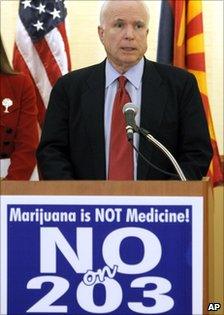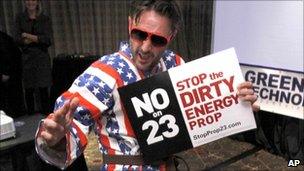US Elections 2010: The world of ballot initiatives
- Published

Proposition 19 has generated huge interest in California
Measures legalising cannabis and banning Sharia law are among those appearing as mini-referendums in this year's US mid-term elections.
Despite what media coverage might suggest, ballot propositions are not always controversial.
It won't be national news that voters in South Carolina are being asked whether it would be desirable for the "Capital Reserve Fund to be used to fully replenish a percentage of General Reserve Fund".
But California's Proposition 19 - a measure to partially legalise cannabis - has been a big story for a long time. If it is passed, and the polling has so far been inconclusive, it could prompt a huge legal battle.
Its proponents say it will generate billions in tax revenue and free up police to tackle violent crime. Its opponents say it is a badly-written law that will cause chaos.
Likewise there has been plenty of attention paid to Oklahoma's plan - Question 755 - to ban the use of Muslim Sharia law in decisions by state courts.
The author of the law, Republican state representative Rex Duncan, told the Edmond Sun newspaper, external the measure was a "pre-emptive strike against Sharia law coming to Oklahoma". It would prevent what had happened in the UK, he said, where experts in Islamic and UK law sit on a number of Muslim arbitration tribunals.

Other states have measures to stop cannabis
"It is a cancer upon the survivability of the UK," Mr Duncan told the paper.
The opponents of the measure point out that state courts are already obliged to use only federal and state law, and say that the proposition raises the spectre of Islamophobia.
Propositions can come in the form of new state law or of changes to the state constitution. They can be proposed by state legislators, but in 22 states ordinary voters can initiate the placing of measures on the ballot, usually by obtaining a certain number of petition signatures.
Proposition 19 is a citizen-initiated state law, while Question 755 is a constitutional amendment referred by state legislators.
But these two measures are not representative of ballot propositions as a whole - a list of which is curated on the wiki site Ballotpedia, external.
This year there are also states voting on efforts to stop the implementation of President Barack Obama's healthcare reform and there are plenty of measures dealing with tax, budgets, borrowing and other mechanisms of government.
In Washington state, Bill Gates's father proposed a measure to bring in personal income tax for those earning over $200,000 (£125,000). Microsoft chief executive Steve Ballmer is a leading opponent.
In Colorado, there are a number of measures aimed at lowering taxes.
In Arizona, Proposition 107 would outlaw affirmative action by state or local government.
But it is California that seems to have more than its fair share of notable measures.
"California is definitely one of the most active states historically," says David Schmidt, author of Citizen Lawmakers: The Ballot Initiative Revolution. "California gets a lot more publicity."
Proposition 8, which outlawed gay marriage in 2008, was a particularly prominent example. Measures elsewhere on social or moral issues, like abortion, also generate major controversy.
And this year as well as the measure to legalise cannabis, there has been Proposition 23, a measure aimed at preventing the implementation of the "AB32" environmental legislation adopted by the state in 2006.
"If you turn on the TV half of the ads will be ballot propositions," says Mr Schmidt.
Knock-on effect
And many of the mini-referendums that seem to be controversial at the time can establish themselves as long-term law.
A ballot initiative in the 1970s helped protect the California coastline from development, Mr Schmidt notes. And in 1978, Proposition 13 limited property taxes, and remains in effect.

Proposition 23 has attracted celebrity interest
"It is known as the third rail in California politics."
Also in California, Proposition 117 in 1990 banned the hunting of mountain lions. A subsequent proposition to overturn the ban failed.
A common ballot initiative is for term limits for state legislators, or for redistricting to be done by an independent commission - rather than by state legislators - to avoid gerrymandering. These are measures that state legislators can sometimes be loath to enact.
Ballot initiatives can have a knock-on effect, as their presence can propel the apathetic to the polling station.
"In a non-presidential election, the initiatives, especially very controversial ones, tend to increase turnout," says Mr Schmidt.
And while there are some who are unsure about the usefulness of their role, they seem likely to continue to be an important feature of American democracy.
"I continue to hear the same complaints," says Mr Schmidt. "There are too many of them, people don't know enough to vote.
"But in order to get rid of them it would take a ballot proposition. I haven't seen any ballot propositions to get rid of ballot propositions."